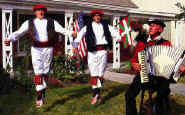|

OINKARI DANCERS
In Boise, IDAHO
Over 20 years ago, a proud young group of Basque Americans dreamed of creating a troupe to preserve and perform the unique
dances of their ancient heritage. They journeyed to the Basque Country in the summer of 1960 in pursuit of this dream. In
the midst of the mountains and sea coast where the Basque culture began, the young people met a group of dancers from the
town of Donostia (or San Sebastian). The American visitors accompanied the dancing group to rehearsals and festivals that
summer and the two groups became fast friends. In the enthusiasm and dedication of this dance troupe, the American Basques
saw a perfect model for their own group in the United States. The friendship between the groups, born of a common heritage
and love of the Basque tradition of dance, lead to the naming of the Basque American "dream" group after their Basque
Country friends. They named the new group "Oinkari" (in Basque, one who does with his feet, or dancer).
The
"dream" group began rehearsals when the travelers returned to Boise. Under the direction of Albert Erquiaga and
Diana Urresti and with the expert musical accompaniment of Jim Jausoro and Domingo Ansotegui, the Oinkari's made their debut
at the annual gathering of area Basques, the Sheepherder's Ball, Christmas time 1960. The dream at last came true. The hard
work continues, the dream has blossomed and the Oinkaris have become a source of pride to the Basque community as well as
the State of Idaho. In the best tradition of folk customs, the dances have been taught to hundreds of young Basques throughout
the years. Dancers and instructors from the Basque country have visited Boise and enriched the group's traditional repertoire.
Some groups members have also had opportunities to travel to the Basque Country and learn additional dances. The dancers are
not professional performers but their innate respect for their culture heritage makes Oinkari performances a whirl of flying
feet and snapping fingers, a thrilling combination of leaping enthusiasm and studied precision, exciting, ancient music and
shouts of exhortation in the language of the Pyrenees.
This enthusiasm has spread to appreciative crowds in World's
Fair exhibitions throughout North American--1962 in Seattle, New York in 1964, Montreal in 1971, and Spokane in 1974, each
time representing Idaho and the Basque people. The group visited six western states during a tour in 1973 and was privileged
to travel to Washington D.C. to perform at a folk festival at the famous Wolf Trap Center. In 1985 to celebrate the its 25th
anniversary, the group made a return voyage to the Basque Country where they performed throughout the seven Basque provinces.
Recently, the group performed at Caesar's Palace in Lake Tahoe, Nevada, and thrilled audiences of fellow Basques at national
Basque gatherings in San Francisco, Bakersfield and Chino, California; Elko and Reno, Nevada; and the Boise valley. The Oinkaris
also perform dozens of times each year for local charities, hospitals, nursing homes and centers for the disabled.
The
current version of the Oinkaris carries on and brightens the dream of the group of 1960. Hundreds of young men and women,
over the years, rehearsed each Sunday at the local Basque Center. Besides performing the same dances that the original group
learned, the group has expanded their repertoire to include almost forty different numbers representing nearly each of the
seven Basque provinces of the Old Country. More than tradition binds the present group to the original one however. Sons
and daughters of that first "dream" group carry on their parents vision. The group is accompanied by the faultless
accordion of Jim Jausoro and the flashing tambourine of Juan Zulaika. The ancient Basque flute or txistu, is played by Edu
Sarria. All the dancers are of Basque descent and at least some are able to speak some of the Basque language.
|
 |
|

